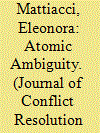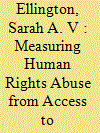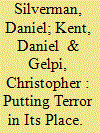|
|
|
Sort Order |
|
|
|
Items / Page
|
|
|
|
|
|
|
| Srl | Item |
| 1 |
ID:
183695


|
|
|
|
|
| Summary/Abstract |
How does dual-use technology influence cooperation? This study explores how the development of nuclear latency (the technological precursors to nuclear weapons) affects U.S. cooperative overtures toward its possessors. We argue that the ambiguous nature of nuclear latency creates uncertainty about the intentions of its possessors and impacts cooperation. Using event data, we find that a state’s possession of overt lab-scale enrichment and reprocessing facilities is significantly correlated with greater cooperative overtures from the United States toward that country. These overtures may serve as effective tools to counter nuclear proliferation among these states. Yet, when latent states engage in a concerted effort to keep their facilities secret, both at the lab and a more advanced “pilot” stage, this relationship is reversed. These results carry important implications for the impact of emerging, dual-use technologies on international security broadly.
|
|
|
|
|
|
|
|
|
|
|
|
|
|
|
|
| 2 |
ID:
183696


|
|
|
|
|
| Summary/Abstract |
Scholars of civil wars have long argued that non-state actors can use selective punishment to reduce collaboration with state adversaries. However, there is little systematic evidence confirming this claim, nor investigation into the mechanisms at play. In this paper, we provide such evidence from the drone war in Pakistan. Militants in Pakistan’s tribal areas engaged in a brutal counterespionage campaign with the aim of reducing collaboration with the United States. Our analysis combines a novel dataset of collaborator killings with data on drone strike outcomes. We find that strikes killed half as many militant leaders and fighters following collaborator killings and that this suppressive effect likely works by deterring spying in the future. Beyond providing an empirical confirmation of the selective punishment hypothesis, our paper suggests an unacknowledged vulnerability of the drone program to reprisals against local allies and collaborators that limits its effectiveness as a long-term tool of counterterrorism
|
|
|
|
|
|
|
|
|
|
|
|
|
|
|
|
| 3 |
ID:
183698


|
|
|
|
|
| Summary/Abstract |
Existing measures of human rights abuses are often only available at the country-year level. Several more fine-grained measures exhibit spatio-temporal inaccuracies or reporting biases due to the primary sources upon which they rely. To address these challenges, and to increase the diversity of available human rights measures more generally, this study provides the first quantitative effort to measure human rights abuses from textual records of citizen-government interactions. Using a dataset encompassing over 1.5 million access-to-information (ATI) requests made to the Mexican federal government from June 2003 onward, supervised classification is used to identify the subset of these requests that pertain to human rights abuses of various types. The results from this supervised machine learning exercise are validated against (i) gold standard ATI requests pertaining to past human rights abuses in Mexico and (ii) several accepted external measures of sub-national and sub-annual human rights abuses. In doing so, we demonstrate that the measurement of human rights abuses from citizen-submitted ATI request texts can provide measures of human rights abuse that exhibit both high validity and notable spatio-temporal specificity, relative to existent human rights datasets and variables.
|
|
|
|
|
|
|
|
|
|
|
|
|
|
|
|
| 4 |
ID:
183697


|
|
|
|
|
| Summary/Abstract |
We reconsider the relationship between oil and conflict, focusing on the location of oil resources. In a panel of 132 countries over the period 1962-2009, we show that oil windfalls escalate conflict in onshore-rich countries, while they de-escalate conflict in offshore-rich countries. We use a model to illustrate how these opposite effects can be explained by a fighting capacity mechanism, whereby the government can use offshore oil income to increase its fighting capacity, while onshore oil may be looted by oppositional groups to finance a rebellion. We provide empirical evidence supporting this interpretation: we find that oil price windfalls increase both the number and strength of active rebel groups in onshore-rich countries, while they strengthen the government in offshore-rich ones.
|
|
|
|
|
|
|
|
|
|
|
|
|
|
|
|
| 5 |
ID:
183692


|
|
|
|
|
| Summary/Abstract |
An American’s yearly chance of being killed by a terrorist attack sits at roughly 1 in 3.5 million. Yet, over 40 percent of Americans consistently believe that they or their family members are likely to be a terror victim. Can these inflated estimates of the risks of terrorism be brought closer to reality? With trillions of dollars spent on the “War on Terror,” this question is not just theoretically but practically important. In order to investigate, we use an experimental approach assessing whether people update their beliefs about terrorism when given factual information about the relative risks it presents. We find that public fear of terrorism and demand for countering it can be sharply reduced with better information, dropping essentially to pre-9/11 levels after the treatment and staying that way two weeks later. These results suggest that countering the indirect costs of terrorism may largely require providing more context and perspective.
|
|
|
|
|
|
|
|
|
|
|
|
|
|
|
|
| 6 |
ID:
183694


|
|
|
|
|
| Summary/Abstract |
States signal their intentions to domestic and foreign audiences but are not always believed. Why do people believe some state signals but not others? Using a survey experiment on a representative sample of the US public, this study finds that individuals have a negativity bias when assessing the credibility of state signals. They take other states’ aggressive actions as evidence of deep hostility but are skeptical of the credibility of conciliatory gestures. The experimental result shows that the mobilization of a small proportion of an army is perceived credible enough as an aggressive action, while the removal of even a large proportion is not perceived as conciliatory. The psychological mechanism found here is a strong foundation for theorizing about how individuals process information embedded in state signals and can improve our understanding of signaling.
|
|
|
|
|
|
|
|
|
|
|
|
|
|
|
|
| 7 |
ID:
183693


|
|
|
|
|
| Summary/Abstract |
How do concerns about fairness shape foreign policy preferences? In this article, we show that fairness has two faces—one concerning equity, the other concerning equality—and that taking both into account can shed light on the structure of important foreign policy debates. Fielding an original survey on a national sample of Americans, we show that different types of Americans think about fairness in different ways, and that these fairness concerns shape foreign policy preferences: individuals who emphasize equity are far more sensitive to concerns about burden sharing, are far less likely to support US involvement abroad when other countries aren’t paying their fair share, and often support systematically different foreign policies than individuals who emphasize equality. As long as IR scholars focus only on the equality dimension of fairness, we miss much about how fairness concerns matter in world politics.
|
|
|
|
|
|
|
|
|
|
|
|
|
|
|
|
|
|
|
|
|